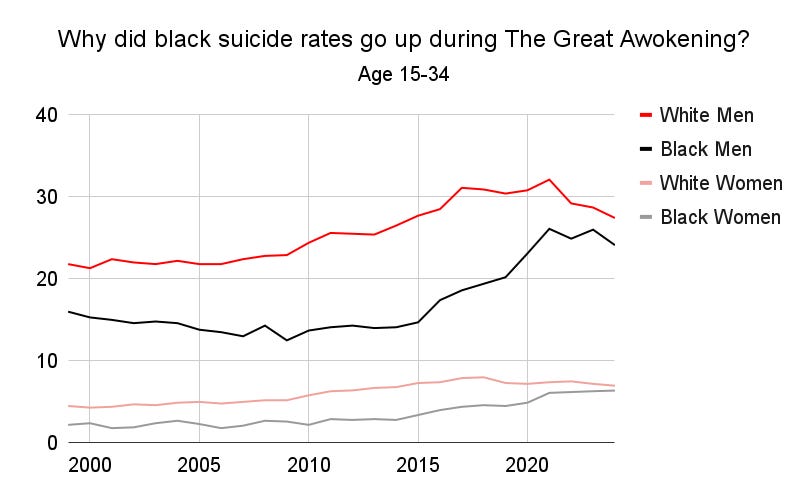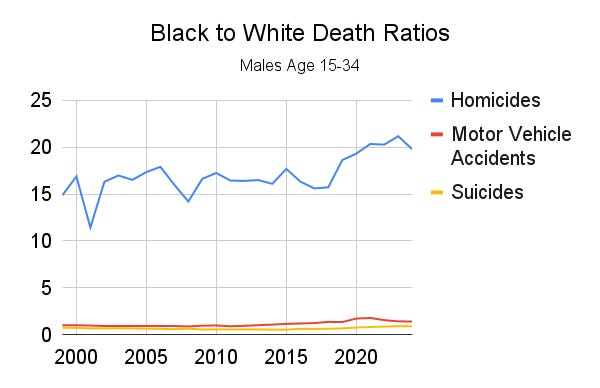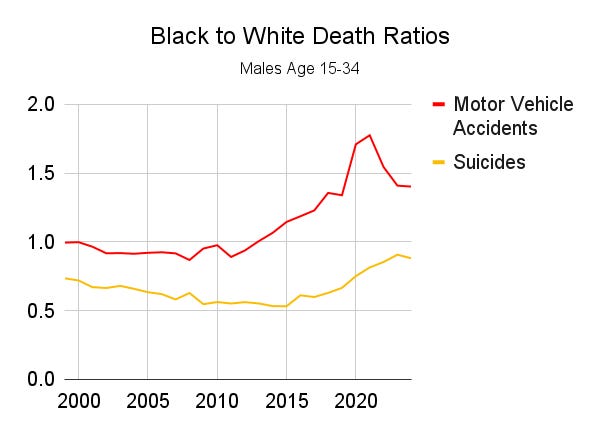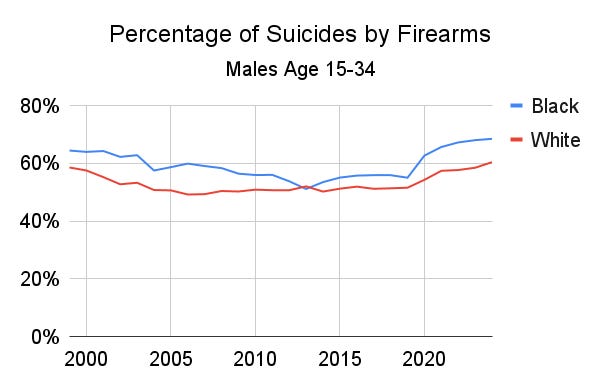Why did black suicides soar during the BLM era?
Blacks have always been less suicidal than whites, but the gap almost closed among young people during the George Floyd Racial Reckoning.
One of the perennial paradoxes of American social science has been that blacks, despite all the oppression they suffer due to systemic racism, kill themselves less often than do privileged whites.
It’s almost as if Charles Darwin was onto something when he wrote in The Descent of Man:
There is, however, no doubt that the various races, when carefully compared and measured, differ much from each other,--as in the texture of the hair, the relative proportions of all parts of the body (2. A vast number of measurements of Whites, Blacks, and Indians, are given in the 'Investigations in the Military and Anthropolog. Statistics of American Soldiers,' by B.A. Gould, 1869, pp. 298-358; 'On the capacity of the lungs,' p. 471. See also the numerous and valuable tables, by Dr. Weisbach, from the observations of Dr. Scherzer and Dr. Schwarz, in the 'Reise der Novara: Anthropolog. Theil,' 1867.), the capacity of the lungs, the form and capacity of the skull, and even in the convolutions of the brain. (3. See, for instance, Mr. Marshall's account of the brain of a Bushwoman, in 'Philosophical Transactions,' 1864, p. 519.) But it would be an endless task to specify the numerous points of difference. The races differ also in constitution, in acclimatisation and in liability to certain diseases. Their mental characteristics are likewise very distinct; chiefly as it would appear in their emotional, but partly in their intellectual faculties. Every one who has had the opportunity of comparison, must have been struck with the contrast between the taciturn, even morose, aborigines of S. America and the light-hearted, talkative negroes.
For example, recently, morose American Indians die by suicide almost three times as often as light-hearted African-Americans.
But, just when the War on Racism became a national obsession during the Great Awokening / Racial Reckoning the gap between black and white suicide rates has closed dramatically. The black suicide rate among young people 15-34 is now around 90% of the white rate.
Paywall here with more graphs below.
Back in 1999, the first year for which the CDC’s WONDER system of mortality statistics displays data, black males age 15-34 died by suicide 73% as white males of the same age. By 2015, the ratio was down to 53% as much.
This improving relative black measure was in some degree due to the steep growth in young white suicides that began around 2010. Suicides, along with overdoses and deaths from alcohol, are one of the three components of the big wave of “deaths of despair” among the white working class in the early 21st Century, as identified by Angus Deaton and Anne Case in 2015.
After a long climb, white male suicides plateaued after 2017, fortunately, and may have declined again in 2024.
Note that the 2024 number is just my projection based on the first 44 weeks of 2024 and assuming suicides continue at the same rate for the last 8 weeks. The CDC puts a six month lag on reporting numbers of suicides (as with homicides and car crash deaths) to give coroners time to be sure in these legally fraught cases.
In contrast, the young black male suicide rate fell from 1999 through 2009, rose slowly in 2010 through 2015, and rose steeply from 2016 through 2021.
What’s going on?
The black upturn may be related to the arrival of fentanyl in the inner city around 2015.
As Sam Quinones has documented, deaths of despair among whites were associated with three successive drug waves, beginning with prescription painkillers like Oxycodone. When the authorities started to crack down on pain pill doctors, the Mexican cartels moved in with heroin. But the cartels avoided selling their black tar to blacks because shooty black drug wars tend to attract more attention than white yokels quietly expiring in Kentucky.
Then fentanyl started to arrive around 2015 (along with a different, perhaps more addictive type of meth that seems tied into the simultaneous surge in homelessness). Unlike heroin, fentanyl is sold in the inner city.
But this is also pretty speculative. How are drugs related to suicides? Hard to say.
Another possibility is that the Great Awokening and the Racial Reckoning, rather than liberating blacks, tended to make them want to kill themselves.
From Sociological Forum:
Identity Politics, Political Ideology, and Well-being: Is Identity Politics Good for Our Well-being?
George Yancey
First published: 12 October 2023 https://doi.org/10.1111/socf.12966
Abstract
Research indicates that political progressives have lower levels of mental well-being than political conservatives. However, while attention has been paid to why conservatives have higher levels of well-being relatively little attention has been used to examine why progressives may have comparatively low levels of well-being. Recent events connected to a “Great Awokening” suggest that identity politics may correlate to a decrease in well-being particularly among young progressives and offer an explanation tied to internal elements within political progressiveness. Regression analysis with data from the Baylor Religion Survey indicates that identity political variables, but not a desire for higher government spending, are consistently negatively related to lower well-being and mediate the ability of progressive political ideology to predict lower levels of well-being. By paying attention to political progressives, rather than political conservatives, a nuanced approach to understanding the relationship between political ideology and well-being begins to emerge. It is plausible that political progressives are not equally prone to lower levels of well-being as those committed to a class-based type of progressive activism seem to be better off than those tied to issues of identity politics.
This too is speculative, since suicides would appear to be classic deaths of despair, while I call homicides and traffic fatalities deaths of exuberance.
If we look at the black to white ratio causes of death, the first thing we notice is that young black men age 15-34 die by homicide an incredible amount more than their white peers:
Young black men died by homicide (mostly at the hands of other young black men) around 16 or 17 times as much from 1999 to 2019 (2011 dipped because it includes 9/11 terrorism as homicide victimizations), and then around 20 times as much during the George Floyd Racial Reckoning.
If we drop homicides from the graph, we can see the changing ratios of black to white suicides and motor vehicle accidents better:
From 2012 on, young black men have had a traffic fatality problem relative to young white men, and the same for suicide from 2016 on.
All these problems seem to be fading in 2024 as the George Floyd Racial Reckoning gets memoryholed, but they are all still substantially worse than before the Black Lives Matter era.
Heckuva job, BLM!
A third possibility is that increased sales of guns during the covid/George Floyd era led to more suicides since suicides are more likely to be successful with guns than with other means:
So, maybe that played a role.
Anyway, I’m pretty much the only analyst who is concerned about how the temporary triumph of Black Lives Matter got so many of my fellow American citizen black lives killed.
That’s because I’m a deplorable racist while people who denounce me, while they may have a lot of blood on their hands, are Good. If you don’t believe me, just listen to them.







The only apparent achievement of the Racial Reckoning was to make everyone feel worse about both themselves and the other race.
Per Gallup, a steady 70% of whites and 65% of blacks described race relations as very/somewhat good during the Dark Ages of 2001-2013. Once leftists and the media stuck their oars in, those numbers plunged to the low 40s and low 30s respectively.
It'd be supremely ironic if the RR ultimately led directly to the abolition of affirmative action and disparate impact, which seems at least possible.
Could pot legalization be a factor? Sports gambling seems much more common, too. Young black men don't typically have a lot of wealth, but if they lose their mother's, too? Black unemployment fell in the pre-covid Trump years--did that make the unemployed feel their failure more?
How do they correctly distinguish intentional ODs from accidental ones?